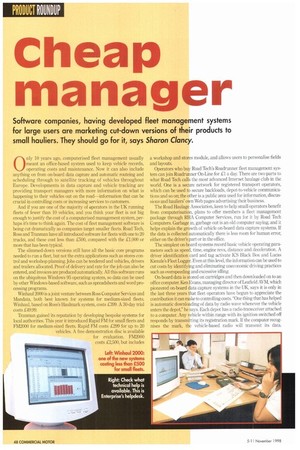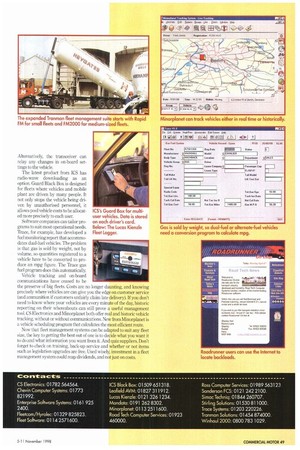PRODUCT ROUNDUP
Page 50

Page 51

If you've noticed an error in this article please click here to report it so we can fix it.
Cheap manager
Software companies, having developed fleet management systems for large users are marketing cut-down versions of their products to small hauliers. They should go for it, says Sharon Clancy.
0 nly 10 years ago, computerised fleet management usually meant an office-based system used to keep vehicle records, operating costs and maintenance. Now it can also include anything on from on-board data capture and automatic routeing and scheduling through to satellite tracking of vehicles throughout Europe. Developments in data capture and vehicle tracking are providing transport managers with more information on what is happening to their vehicles out on the road—information that can be crucial in controlling costs or increasing services to customers.
And if you are one of the majority of operators in the UK running
fleets of fewer than 10 vehicles, and you think your fleet is not big enough to justify the cost of a computerised management system, perhaps it's time to think again. The cost of fleet management software is being cut dramatically as companies target smaller fleets. Road Tech, Ross and Tranman have all introduced software for fleets with one to 20 trucks, and these cost less than £500, compared with the £1,(X)0 or more that has been typical.
The slimmed-down versions still have all the basic core programs
needed to run a fleet, but not the extra applications such as stores control and workshop planning. Jobs can be tendered and vehicles, drivers and trailers allocated. Proof of delivery and rate for the job can also be entered, and invoices are produced automatically. All this software runs on the ubiquitous Windows 95 operating system, so data can he used by other Windows-based software, such as spreadsheets and word processing programs.
Winhaul 2000 is a joint venture between Ross Computer Services and Mandata, both best known for systems for medium-sized fleets. Winhaul, based on Ross's Haulmark system, costs £399. A 30-day trial costs £49.99.
Tranman gained its reputation by developing bespoke systems for local authorities. This year it introduced Rapid FM for small fleets and FM2000 for medium-sized fleets. Rapid FM costs £299 for up to 20 vehicles. A free demonstration disc is available for evaluation. FM2000 costs £2,500, but includes a workshop and stores module, and allows users to personalise fields and layouts.
Operators who buy Road Tech's Roadrunner fleet management system can join Roadrunner On-Line for £1 a day. There are two parts to what Road Tech calls the most advanced Internet haulage club in the world. One is a secure network for registered transport operators, which can be used to secure backloads, depot-to-vehicle communications and so on; the other is a public area used for information, discussions and hauliers' own Web pages advertising their business.
The Road Haulage Association, keen to help small operators benefit from computerisation, plans to offer members a fleet management package through RHA Computer Services, run for it by Road Tech Computers. Garbage in, garbage out is an old computer saying, and it helps explain the growth of vehicle on-board data capture systems. If the data is collected automatically there is less room for human error, either on the driver's part or in the office.
The simplest on-board systems record basic vehicle operating parameters such as speed, time, engine revs, distance and deceleration. A driver identification card and tag activate ICS Black Box and Lucas Kienzle's Fleet Logger. Even at this level, the information can be used to cut costs by identifying and eliminating uneconomic driving practices such as overspeeding and excessive idling.
On-board data is stored on cartridges and then downloaded on to an office computer. Ken Evans, managing director of Leafield AVM, which pioneered on-board data capture systems in the UK, says it is only in the last three years that fleet operators have begun to appreciate the contribution it can make to controlling costs. "One thing that has helped is automatic downloading of data by radio wave whenever the vehicle enters the depot," he says. Each depot has a radio transceiver attached to a computer. Any vehicle within range with its ignition switched off responds by transmitting its registration mark. If the computer recognises the mark, the vehicle-based radio will transmit its data.
Alternatively, the transceiver can relay any changes in on-board settings to the vehicle.
The latest product from ICS has radio-wave downloading as an option. Guard Black Box is designed for fleets where vehicles and mobile plant are driven by many people. It not only stops the vehicle being driven by unauthorised personnel, it allows pool vehicle costs to be allocated more precisely to each user.
Software companies can tailor programs to suit most operational needs. Trace, for example, has developed a fuel monitoring report that accommodates dual-fuel vehicles. The problem is that gas is sold by weight, not by volume, so quantities registered to a vehicle have to be converted to produce an mpg figure. The Trace gas fuel program does this automatically.
Vehicle tracking and on-board communications have ceased to be the preserve of big fleets. Costs are no longer daunting, and knowing precisely where vehicles are can give you the edge on customer service (and ammunition if customers unfairly claim late delivery). If you don't need to know where your vehicles are every minute of the day, historic reporting on their whereabouts can still prove a useful management tool. CS Electronics and Minorplanet both offer real and historic vehicle tracking, without or without communications. New from Minorplanet is a vehicle scheduling program that calculates the most efficient route.
Now that fleet management systems can be adapted to suit any fleet size, the key to getting the best out of one is to decide what you want it to do and what information you want from it. And quiz suppliers. Don't forget to check on training, back-up service and whether or not items such as legislation upgrades are free. Used wisely, investment in a fleet management system could reap dividends, and not just on costs.


























































































































